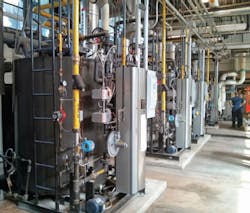Muira Boilers Chosen to Support Green Initiatives at Manchester Memorial Hospital
Overview
Opening its doors in 1920 in memoriam of the 45 Manchester men who died in World War I, Manchester Memorial Hospital is a 249-bed, acute care facility offering comprehensive inpatient and outpatient services to communities east of Hartford, CT. Manchester Memorial is an affiliate of the Eastern Connecticut Health Network (ECHN)—a not-for-profit healthcare system whose mission is to provide high-quality healthcare to the communities of eastern Connecticut. With the network’s combined resources and expertise, its members are able to invest in state-of-the-art technologies that create more convenient and expansive services for their patients.
Objectives/Challenges
Due to rapid transformations within the healthcare industry, ECHN remains diligent in efforts to reduce costs and enhance patient outcomes, all while adhering to new laws and evolving technologies. One such project undertaken by the network was to update and replace Manchester Memorial’s old and inefficient systems (HVAC, lighting, building controls, water, fire, and security). In particular, three 400-horsepower oil-fired boilers, installed in 1966, were badly outdated, bulky and highly inefficient.
Challenged by tightening budgets, aging infrastructure, federal regulations and volatile energy prices, Manchester Memorial needed a complete overhaul of its systems, while not disrupting normal hospital operations.
After several years of exploring different options, Manchester Memorial Hospital decided to work with Miura as a part of a larger project to increase overall efficiency.
Solutions
In order to maximize ROI (return on investment), as well as the operational benefits of the core ECMs, Miura partnered with the Building Technologies Division of Siemens Industry Inc., to offer the most comprehensive energy conservation approach. Based on extensive energy studies, a primary focus for the project was to replace the hospital’s aging oil-fired boilers with four 150-horsepower, dual-fuel EX-150 SGO boilers from Miura.
“Because we are a hospital, we had several uses for the boilers and several requirements,” explained Vinnie DeFrancesco, Director of Engineering and Biomedical Engineering at ECHN. “We needed N+1 redundancy and—looking at overall efficiency as well as a combination of the physical number of boilers available—Miura fit the best.”
The EX-150 SGO dual-fuel series feature an exclusive “low water content, water tube” design that makes it one of the most versatile boilers available in the marketplace today. The once through, forced-circulation steam boiler produces steam in just 5 minutes, while maintaining an 85% fuel-to-steam efficiency—currently unheard of in the industry. These boilers boast a gas-oil dual fuel burner: up to 300 BHP per boiler, and up to 4,500 HP in a multiple installation system.
In addition to the on-demand steam and energy-efficient boilers, Miura provided a complete water treatment and remote monitoring system to concurrently increase the hosp-ital’s conservation efforts. With the proprietary and eco-friendly corrosion inhibitor, BOILERMATE®, alongside the advanced diagnostic and remote monitoring abilities of the BL Micro Controller, Miura’s total system integration not only addressed the current efficiency needs for the hospital, but the future needs as well.
“Having newer boilers certainly helps with a lot of the problems we have,” explained DeFrancesco. “In most of the cases, it wasn’t so much all the repairs involved with the boilers as it was all the other systems. You had the water treatment system, the deionizer tanks, the pumps, et cetera—yet they weren’t automated. If we had to go to change a boiler, we had to turn one off, go turn on another—everything was a manual process! Miura has a great computer system, and we look forward to using it to see everything.”
Results
Fulfilling the promises made alongside Siemens, the four new 150-HP, dual-fueled Miura Boilers are estimated to help Manchester Memorial save nearly half a million dollars per year in fuel and energy costs, and have helped the hospital qualify for a one-time utility rebate totaling approximately $1.2 million.
The boiler retrofit alone has saved the hospital approximately $180,000 per year by reducing fuel expenses up to 35%.
The boiler retrofits will not only save the hospital a great deal of money, but will also benefit the hospital’s environmental impact. Miura boilers output significantly reduced levels of nitrogen oxides (NOx), a major contributor to air pollution, as well as carbon dioxide (CO2), the most prevalent of greenhouse gases. As compared to conventional boilers, Miura boilers are able to comply with even the most stringent air quality regulations. This program between Siemens and Miura identifies a total yearly carbon footprint reduction for the hospital of 5,308,357 pounds of CO2—the equivalent of planting 16 acres of trees, or taking 441 cars off the road.
“Significantly low NOx and CO2 emissions were another reason we chose Miura,” states DeFrancesco. “We actually just went through the calculations and emissions for our state GPLPE (General Permit to Limit Potential to Emit) reports, and I am glad to say that we are now able to opt out of the high emissions generator [category] for those pollutants.”
The positive effects of the energy efficiency improvements as a whole—including the crucial boiler retrofits—will be pervasive and long lasting; not only reducing energy and water consumption significantly, but also reducing operations and maintenance costs by approximately $28,500 annually.
“We have been consistently diligent in our efforts to find ways to reduce our costs. With this project, we are achieving this goal by creating a healthier, environmentally friendly and cost-efficient facility that will better serve our patients and staff for decades to come,” stated Peter J. Karl, President and CEO of ECHN.


